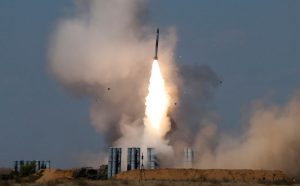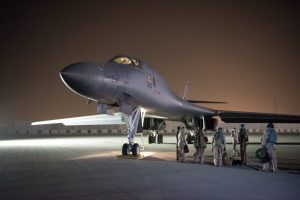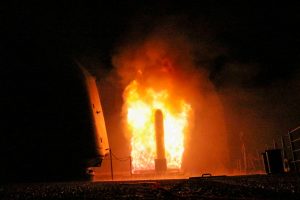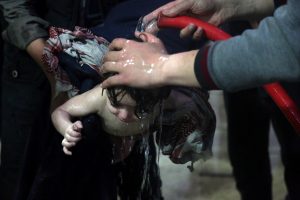
By Steve Holland and Tom Perry
WASHINGTON/BEIRUT (Reuters) – U.S., British and French forces struck Syria with more than 100 missiles on Saturday in the first coordinated Western strikes against the Damascus government, targeting what they called chemical weapons sites in retaliation for a poison gas attack.
U.S. President Donald Trump announced the military action from the White House, saying the three allies had “marshaled their righteous power against barbarism and brutality”.
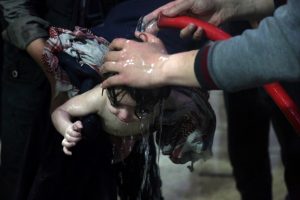
A child is treated in a hospital in Douma, eastern Ghouta in Syria, after what a Syria medical relief group claims was a suspected chemical attack April, 7, 2018. White Helmets/Handout via REUTERS
As he spoke, explosions rocked Damascus. In the morning he tweeted: “Mission accomplished”.
The bombing represents a major escalation in the West’s confrontation with Assad’s superpower ally Russia, but is unlikely to alter the course of a multi-sided war which has killed at least half a million people in the past seven years.
That in turn raises the question of where Western countries go from here, after a volley of strikes denounced by Damascus and Moscow as at once both reckless and pointless.
By morning, the Western countries said their bombing was over for now. Syria released video of the wreckage of a bombed-out research lab, but also of President Bashar al-Assad arriving at work as usual, with the caption “morning of resilience”.
There were no immediate reports of casualties, with Damascus allies saying the buildings hit had been evacuated in advance.
British Prime Minister Theresa May described the strike as “limited and targeted”, with no intention of toppling Assad or intervening more widely in the war. She said she had authorized British action after intelligence showed Assad’s government was to blame for gassing the Damascus suburb of Douma a week ago.
In a speech she gave a vivid description of the victims of the chemical strike that killed scores, huddling in basements as gas rained down. She said Russia had thwarted diplomatic efforts to halt Assad’s use of poison gas, leaving no option but force.
French President Emmanuel Macron said the strikes had been limited so far to Syria’s chemical weapons facilities. Paris released a dossier which it said showed Damascus was to blame for the poison gas attack on Douma, the last town holding out in a rebel-held swathe of territory near Damascus which government forces have recaptured in this year’s biggest offensive.
Washington described its targets as a center near Damascus for the research, development, production and testing of chemical and biological weapons, a chemical weapons storage site near the city of Homs and another site near Homs that stored chemical weapons equipment and housed a command post.
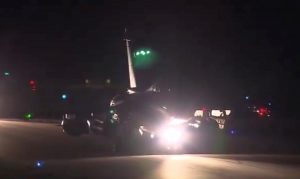
A plane prepares to take off as part of the joint airstrike operation by the British, French and U.S. militaries in Syria, in this still image from video footage obtained on April 14, 2018 from social media. courtesy Elysee/Twitter/via REUTERS
U.S. Defense Secretary Jim Mattis called the strikes a “one time shot”, although Trump raised the prospect of further strikes if Assad’s government again used chemical weapons.
“We are prepared to sustain this response until the Syrian regime stops its use of prohibited chemical agents,” the U.S. president said in a televised address.
Russian President Vladimir Putin called for a meeting of the U.N. Security Council to discuss what Moscow decried as an unjustified attack on a sovereign state. Diplomats said the meeting would take place in New York at 11:00 am (1500 GMT).
Syrian state media called the attack a “flagrant violation of international law.” Iran’s Supreme Leader Ayatollah Ali Khamenei called it a crime and the Western leaders criminals.
Inspectors from the global chemical weapons watchdog OPCW were due to try to visit Douma later on Saturday to inspect the site of the April 7 suspected gas attack. Moscow condemned the Western states for refusing to wait for their findings.
Russia, whose relations with the West have deteriorated to levels of Cold War-era hostility, has denied any gas attack took place in Douma and even accused Britain of staging it to whip up anti-Russian hysteria.
But despite responding outwardly with fury to Saturday’s attack, Damascus and its allies also made clear that they considered it a one-off, unlikely to meaningfully harm Assad.
“ABSORBED” THE ATTACKS
A senior official in a regional alliance that backs Damascus told Reuters the Syrian government and its allies had “absorbed” the attack. The sites that were targeted had been evacuated days ago thanks to a warning from Russia, the official said.
“If it is finished, and there is no second round, it will be considered limited,” the official said.
Dmitry Belik, a Russian member of parliament who was in Damascus and witnessed the strikes, told Reuters by email: “The attack was more of a psychological nature rather than practical. Luckily there are no substantial losses or damages.”
At least six loud explosions were heard in Damascus and smoke rose over the city, a Reuters witness said. A second witness said the Barzah district of Damascus was hit.
A scientific research lab in Barzah appeared to have been completely destroyed, according to footage broadcast by Syrian state TV station al-Ikhbariya. Smoke rose from piles of rubble and a heavily damaged bus was parked outside.
But the Western intervention has virtually no chance of altering the military balance of power at a time when Assad is in his strongest position since the war’s early months.
ASSAD STRONG
In Douma, site of last week’s suspected gas attack, the final buses were due on Saturday to transport out rebels and their families who agreed to surrender the town, Syrian state TV reported. That effectively ends all resistance in the suburbs of Damascus known as eastern Ghouta, marking one of the biggest victories for Assad’s government of the entire war.
Russian and Iranian military help over the past three years has let Assad crush the rebel threat to topple him.
The United States, Britain and France have all participated in the Syrian conflict for years, arming rebels, bombing Islamic State fighters and deploying troops on the ground to fight that group. But they have refrained from targeting Assad’s government apart from a volley of U.S. missiles last year.
Although the Western countries have all said for seven years that Assad must leave power, they held back in the past from striking his government, lacking a wider strategy to defeat him.
The Western powers were at pains on Saturday to avert any further escalation, including any unexpected conflict with their superpower rival Russia. French Defense Minister Florence Parly said the Russians “were warned beforehand” to avert conflict.
The combined U.S., British and French assault involved more missiles, but appears to have struck more limited targets, than a similar strike Trump ordered a year ago in retaliation for an earlier suspected chemical weapons attack. Last year’s U.S. strike, which Washington said at the time would cripple Assad’s air forces and defenses, had effectively no impact on the war.
Mattis said the United States conducted the strikes with conclusive evidence that chlorine gas had been used in the April 7 attack in Syria. Evidence that the nerve agent sarin also was used was inconclusive, he said.
Syria agreed in 2013 to give up its chemical weapons after a nerve gas attack killed hundreds of people in Douma. Damascus is still permitted to have chlorine for civilian use, although its use as a weapon is banned. Allegations of Assad’s chlorine use have been frequent during the war, although unlike nerve agents chlorine did not produce mass casualties as seen last week.
Mattis, who U.S. officials said had earlier warned in internal debates that too large an attack would risk confrontation with Russia, described the strikes as a one-off to dissuade Assad from “doing this again”.
But a U.S. official familiar with the military planning said there could be more air strikes if the intelligence indicates Assad has not stopped making, importing, storing or using chemical weapons, including chlorine. The official said this could require a more sustained U.S. air and naval presence.
EXIT SYRIA?
The U.S., British and French leaders all face domestic political issues surrounding the decision to use force in Syria.
Trump has been leery of U.S. military involvement in the Middle East, and is eager to withdraw roughly 2,000 troops in Syria taking part in the campaign against Islamic State.
“America does not seek an indefinite presence in Syria, under no circumstances,” Trump said in his address.
Trump has tried to build good relations with Russian President Vladimir Putin. A prosecutor is investigating whether Trump’s campaign colluded with Moscow in illegal efforts to help him get elected, an investigation Trump calls a witch hunt.
In Britain, May’s decision to strike without consulting parliament overturns an arrangement in place since the 2003 invasion of Iraq. Her predecessor David Cameron was politically hurt when he lost a parliamentary vote on whether to bomb Syria.
Britain has led international condemnation of Russia, persuading more than 20 countries to expel Russian diplomats, over the poisoning with a nerve agent of a former Russian spy in England last month. May made clear that case was part of her calculus in ordering retaliation for chemical weapons in Syria.
She argued on Saturday it was necessary to act quickly without waiting for parliament’s approval. Opposition leader Jeremy Corbyn accused her of following Trump, hugely unpopular in Britain, into battle without waiting for the evidence.
In France, Macron has long threatened to use force against Assad if he uses chemical weapons, and had faced criticism over what opponents described as an empty threat.
To view a graphic on an overview of chemical warfare, click: http://tmsnrt.rs/2pKDWOY
(Reporting by Steve Holland and Tom Perry,; Additional reporting by Phil Stewart, Tim Ahmann, Eric Beech, Lesley Wroughton, Lucia Mutikani, Idrees Ali, Patricia Zengerle, Matt Spetalnick and John Walcott in Washington; Samia Nakhoul, Tom Perry, Laila Bassam, Ellen Francis and Angus McDowall in Beirut; Michael Holden and Guy Faulconbridge in London; and Jean-Baptiste Vey, Geert de Clerq and Matthias Blamont in Paris; Polina Ivanova in Moscow; Writing by Peter Graff; Editing by Angus MacSwan)



